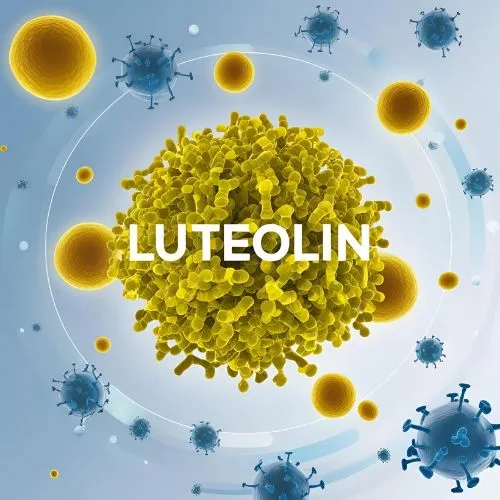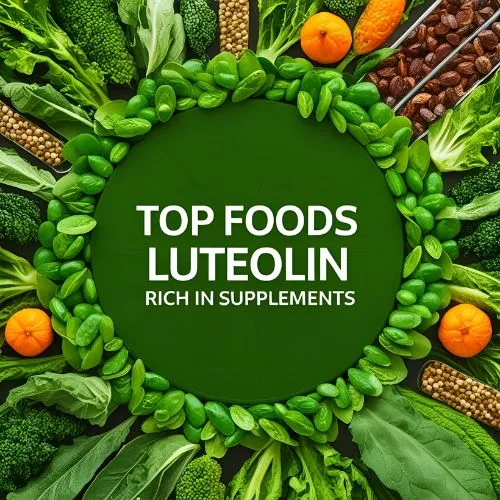How Luteolin Protects Against Inflammation and Supports Cellular Health?
Luteolin, a powerful flavonoid found in various fruits, vegetables, and herbs, has garnered significant attention in the scientific community for its remarkable anti-inflammatory properties and ability to support cellular health. This naturally occurring compound offers a wide range of potential health benefits, from reducing chronic inflammation to promoting longevity at the cellular level. In this comprehensive guide, we'll explore the fascinating world of luteolin and its impact on human health.

What Are the Anti-Inflammatory Benefits of Luteolin?
Inflammation is a natural bodily response to injury or infection, but when it becomes chronic, it can lead to various health issues. Luteolin has emerged as a potent anti-inflammatory agent, offering several benefits:
Inhibition of Inflammatory Pathways
Luteolin works by suppressing key inflammatory pathways in the body. It inhibits the activation of nuclear factor kappa B (NF-κB), a protein complex that plays a crucial role in regulating the immune response to infection. By modulating NF-κB activity, it helps reduce the production of pro-inflammatory cytokines, which are signaling molecules that promote inflammation.
Reduction of Oxidative Stress
Oxidative stress, caused by an imbalance between free radicals and antioxidants in the body, is closely linked to inflammation. Luteolin exhibits potent antioxidant properties, neutralizing harmful free radicals and reducing oxidative damage to cells. This antioxidant activity contributes to its overall anti-inflammatory effects.
Modulation of Immune Response
Luteolin has been shown to modulate the immune system by influencing the activity of various immune cells, including T cells, B cells, and macrophages. This immunomodulatory effect helps balance the immune response, potentially reducing excessive inflammation associated with autoimmune disorders and allergies.
Protection Against Neuroinflammation
Emerging research suggests that luteolin may have neuroprotective properties, particularly in relation to neuroinflammation. By crossing the blood-brain barrier, it can help reduce inflammation in the central nervous system, potentially offering benefits for conditions such as Alzheimer's disease and multiple sclerosis.

How Luteolin Supports Cellular Health and Longevity?
Beyond its anti-inflammatory properties, luteolin plays a crucial role in supporting overall cellular health and promoting longevity. Here are some key ways in which it contributes to cellular well-being:
Activation of Cellular Defense Mechanisms
Luteolin has been shown to activate Nrf2 (nuclear factor erythroid 2-related factor 2), a protein that controls the expression of antioxidant genes. By stimulating Nrf2, it boosts the body's natural defense mechanisms, enhancing its ability to combat oxidative stress and cellular damage. This activation helps protect cells from damage and supports overall health by improving the body’s antioxidant response.
Mitochondrial Support
Mitochondria, often referred to as the powerhouses of cells, play a crucial role in energy production and cellular health. Luteolin has been found to support mitochondrial function by reducing oxidative damage and improving energy metabolism, which can contribute to overall cellular longevity.
Regulation of Cellular Senescence
Cellular senescence, the process by which cells stop dividing and enter a state of growth arrest, is associated with aging and age-related diseases. Luteolin has shown promise in regulating cellular senescence, potentially slowing down the aging process at the cellular level.
DNA Protection
Luteolin exhibits genoprotective properties, helping to protect DNA from damage caused by oxidative stress and environmental toxins. This DNA-protective effect is crucial for maintaining cellular health and preventing mutations that could lead to various diseases, including cancer.
Autophagy Promotion
Autophagy is a cellular process that involves the breakdown and recycling of cellular components. Luteolin has been shown to promote autophagy, which is essential for cellular rejuvenation and the removal of damaged proteins and organelles. This process is vital for maintaining cellular health and function.

Top Foods and Supplements Rich in Luteolin
To harness the benefits of luteolin, consider incorporating the following foods and supplements into your diet:
Luteolin-Rich Foods
- Celery: A excellent source of luteolin, celery contains significant amounts of this flavonoid in both its leaves and stalks.
- Parsley: This herb is not only a flavorful addition to dishes but also a rich source of luteolin.
- Green Bell Peppers: These versatile vegetables contain substantial amounts of luteolin, particularly in their skin.
- Chamomile Tea: Known for its calming properties, chamomile tea is also a good source of luteolin.
- Radicchio: This Italian chicory is not only visually striking but also contains notable levels of luteolin.
- Oregano: This aromatic herb is packed with luteolin and other beneficial compounds.
- Artichokes: These unique vegetables are not only delicious but also rich in luteolin.
Luteolin Supplements
For those looking to increase their luteolin intake beyond dietary sources, supplements are available in various forms:
- Luteolin Powder: A versatile option that can be added to smoothies or other beverages.
- Capsules: Convenient for daily supplementation with precise dosing.
- Liposomal Formulations: These offer enhanced bioavailability for improved absorption.
- Combination Supplements: Often paired with other flavonoids like quercetin for synergistic effects.
When considering supplements, it's crucial to consult with a healthcare professional to determine the appropriate dosage and ensure there are no contraindications with existing medications or health conditions.

Conclusion
Luteolin stands out as a powerful ally in the quest for optimal health and longevity. Its multifaceted approach to combating inflammation, supporting cellular health, and promoting overall well-being makes it a valuable compound for those seeking natural ways to enhance their health. By incorporating luteolin-rich foods into your diet or considering high-quality supplements, you can tap into the potential benefits of this remarkable flavonoid.
For more information on product and other natural plant extracts, please contact us at info@yanggebiotech.com. Our team of experts is dedicated to providing innovative, high-quality raw material solutions to meet your health and wellness needs.
References
1. Zhang, Y., et al. (2021). "Luteolin: A Review of Its Anti-inflammatory and Neuroprotective Effects." International Journal of Molecular Sciences.
2. Seelinger, G., et al. (2008). "Anti-inflammatory Effects of the Flavonoid Luteolin in Cellular and Animal Models." Planta Medica.
3. Nabavi, S.F., et al. (2015). "Neuroprotective Effects of Luteolin: A Review of Its Cellular and Molecular Mechanisms." Neurochemistry International.
4. Jia, Z., et al. (2014). "The Synergistic Effects of Luteolin and Vitamin D3 in Preventing Inflammation and Arthritis in Mice." Food & Function.
5. Theoharides, T.C. (2009). "Luteolin as a Therapeutic Option for Multiple Sclerosis." Journal of Neuroinflammation.

Based on your location and order quantity, you will have the opportunity to receive a limited time free shipping promotion!

Who we are


